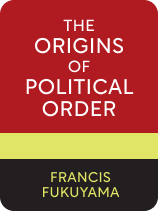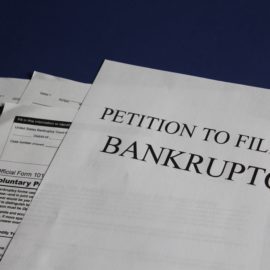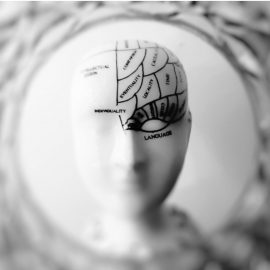

This article is an excerpt from the Shortform book guide to "The Origins of Political Order" by Francis Fukuyama. Shortform has the world's best summaries and analyses of books you should be reading.
Like this article? Sign up for a free trial here.
How and when did government develop as an institution? How are governments held accountable? What makes a democracy stable?
The Origins of Political Order by Francis Fukuyama explores the development of political systems from prehistory to the eve of the American and French revolutions in the late 18th century. Fukuyama is interested in how and why contemporary liberal democracies emerged.
Keep reading for an overview of the book.
The Origins of Political Order by Francis Fukuyama
In The Origins of Political Order, Francis Fukuyama argues that there are three main components of a stable democratic society:
- A strong state capable of wielding military power, collecting taxes, and enforcing laws.
- The rule of law—the belief in an ordering principle higher than the state itself by which the state must abide if it’s to remain legitimate.
- Accountability, which means that a state respects the rights and needs of its citizens, to whom it must ultimately answer.
The book explores how each of these traits evolved throughout various historical cultures and argues that the weakness or absence of one or more of these components leads to either authoritarianism or government collapse. Fukuyama contends that understanding these principles will help government agencies and political observers understand why some contemporary countries struggle to implement or sustain healthy, functional, and free institutions—an understanding that will presumably lead to better policies. The book is written for a general audience, though it assumes readers have a strong interest in contemporary and historical politics and at least some background in political theory.
Fukuyama is a political economist best known for The End of History and the Last Man (1992). The Origins of Political Order was released in 2012 as the first of two volumes—the second, 2014’s Political Order and Political Decay, picks up where Origins leaves off by explaining political developments from the Industrial Revolution in the 18th century to the present.
This overview is divided into four parts. In Part 1, we’ll examine the fundamental social dynamics that led to—and complicated—the development of modern governments. In Parts 2-4, we’ll explore each of Fukuyama’s three pillars (state, rule of law, and accountability).
Part 1: The Origins of Government
Fukuyama’s central goal is to explain the development of the state—by which he means a centrally organized institution that creates and enforces laws within a defined territory. Fukuyama says that, to fully understand the origins of states, we need to understand earlier social structures.
The First Societies: Kinship Bands
Fukuyama begins his account of political evolution tens of thousands of years before the first state by examining the earliest human societies. He does so because he believes that humans are fundamentally social and political and have always lived in cooperative social groups.
Fukuyama says the earliest forms of organized society were kinship bands—nomadic groups of extended relatives. There were no governments or rulers per se. Group leaders were chosen by consensus, and what power they had depended on the respect they commanded among their kin.
Also, Fukuyama says that, because these groups were nomadic, they had no formal laws. Instead, he says, these groups were governed by norms that promoted desirable behaviors.
The Invention of Agriculture Leads to Tribes
According to Fukuyama, once humans developed agriculture, they transitioned from kinship bands to tribes—larger, more loosely related groups tied to particular pieces of land. He explains that tribal society evolved from the need to govern and defend land. Tribes grew much larger than kinship bands.
Part 2: The State
Of the three pillars of modern democracy, we begin with the state because it developed the earliest. Moreover, a strong state is fundamental to any form of government. As we’ll see, it’s entirely possible to have a strong, stable government with no rule of law or accountability. But, without a strong state, a country remains a collection of disparate groups with no real political unity.
Features of a State
Fukuyama outlines several distinctive features of a state:
- A strong central authority
- A stratified class system
- More complicated religion and a separate clerical class: These more advanced forms of religion often serve to legitimize the political order.
- Composition based on territory (with borders) rather than kinship
- Centralized and exclusive control of police and military forces: In a state, the military directly serves the central government rather than individual warlords. This allows a state to enforce its laws and defend and expand its borders.
How States Overcame Kinship
According to Fukuyama, the biggest obstacle to state formation is the kinship tie that defines tribal society. One way to escape kinship ties is to impose an impersonal system of government such as a bureaucracy—organization around a permanent class of trained professional government employees. According to Fukuyama, the first state emerged in China during the Eastern Zhou Dynasty (770-256 BC) with the invention of bureaucracy. Bureaucrats were selected for their skills rather than their familial connections, and this shift ultimately let state leaders exercise much more power than when they had to navigate a government staffed by their relatives.
The other way states have escaped kinship ties is by avoiding them altogether. For example, Fukuyama argues that, in Western Europe, the Catholic Church dissolved extended kin relationships before states ever formed. He explains that, in order to expand its land and wealth, the Church systematically opposed practices (such as intermarriage between cousins and adoption) that tended to keep these resources bound up in hereditary kin groups. The result was that more Christians died without heirs and willed their property to the Church.
Crucially, this move away from kinship happened before European state-building began, which meant that European states never had to reckon with kinship. Instead, Fukuyama says, European society became individualistic, meaning that decisions about issues like property and marriage fell to individuals rather than kinship groups. As a result, European society reorganized around impersonal, contractual property relations—relations that, as we’ll see, were important to the later development of accountability.
Part 3: The Rule of Law
After the state, the second major component of a modern liberal democracy is the rule of law—the belief that the state is constrained by some higher standard of conduct. Fukuyama defines the rule of law as the authority of law over legislation. In this context, law refers to the abstract principles of justice and order accepted by a community, whereas legislation refers to the creation and application of specific judicial rules.
Fukuyama argues that the rule of law typically comes from a culture’s religion. He asserts that, in India and Western Europe, religious law (in the form of Indian Brahmanism and European Catholicism) shaped society before states ever emerged. Similarly, he argues that, in the Islamic Middle East, religion and the state arose together, resulting in an Islamic state called a caliphate, in which a religious leader (a caliph) places checks on secular political authority. In all of these cases, leaders were bound by the idea that there was a divine law by which human law had to abide. As a result, leaders in these cultures had at least nominal checks on their power, and their legitimacy depended on their adherence to the rule of law.
The Importance of the Rule of Law
Fukuyama points out that a strong rule of law is important because it constrains government power. To say a society is bound by the rule of law is to say that governments and rulers don’t have absolute authority to do whatever they want. Because the rule of law limits governmental powers, it naturally follows that, without the rule of law, governments tend toward authoritarianism.
Fukuyama gives China as an example of a culture where this tendency has existed historically and survives today. He says that the Chinese state religion never developed beyond ancestor worship. As a result, there was never a sense of a higher law by which Chinese rulers had to abide.
Limits of the Rule of Law
Fukuyama points out that authoritarianism is still possible—albeit in a weaker form—in states that respect the rule of law. For example, in the 16th and 17th centuries, France created a limited authoritarian state by selling off state offices. The state earned money from the sales, and officeholders gained political influence, tax exemptions, and ongoing revenue streams. Because office holders were interested in their personal gain, they never coalesced as a political unit. By essentially buying the loyalty of their opponents, French kings were left with few checks on their authority. Commoners who’d been left out of the system rose up in the French Revolution of 1789.
Part 4: Accountability
The final piece of the puzzle that makes up a modern liberal democracy is accountability—a state’s commitment to the rights and needs of the people it governs. England is the only state to develop strong accountability in the time period this book covers (prehistory through the mid-18th century).
Feudalism as a Precursor of Accountability
Fukuyama argues that European development in general provided the basis for state accountability in the form of the feudal system. Feudal nobles and gentry (a class of landowners who weren’t part of a state’s traditional hereditary nobility) had their own lands, their own incomes from those lands, and, in the case of nobility, castles and armies of their own. This gave them political leverage that counterbalanced state power and pushed rulers to cooperate with those they governed. Also, feudalism created a nominal sense of obligation for the upper class toward the lower class.
From Obligation to Accountability
Because the feudal balance of power placed them in a relatively strong bargaining position, the land-owning classes eventually sought to solidify and expand their rights and constrain royal power by implementing state constitutions. Fukuyama points out that England, in particular, developed its sense of accountability in part from the Magna Carta, a charter of rights imposed on King John by a group of barons in 1215.
Fukuyama explains that, in 1222, King Andrew II of Hungary was forced to accept the Golden Bull, a document superficially similar to England’s Magna Carta. But, whereas the Magna Carta was a response to perceived oversteps by the king, the Golden Bull aimed to ease tensions between the traditional nobility and the newly emerging gentry. As a result, instead of creating political solidarity (as the Magna Carta did), the Golden Bull aligned the gentry with the nobility at the expense of the Hungarian state and its commoners—a move that undermined the government’s power and led to the country’s invasion and collapse.
Factors Leading to English Democracy
Fukuyama points out that England’s political solidarity was unusual for this time period. He argues that England was different for two reasons: English society’s long-standing organization around local politics and its emphasis on the legal system as the source of political legitimacy.
Factor #1: Shire Politics
Fukuyama says that, from the start of the Anglo-Saxon period around AD 450, England was organized around local politics (shires) rather than kin groups. When the Normans conquered England in 1066, they left this system in place, though they redesignated “shires” as “counties”—which are still the main political division in contemporary England.
Shires were unique in that they were structured from the bottom up and from the top down, which led to a balance of power between state and local interests and a sense that the state was accountable to the shires just as the shires were to the state. Fukuyama explains that shire politics were open to all free men (later all landowners), which gave commoners a significant political voice. At the same time, as a representative of the crown, the sheriff imposed state authority at the local level.
Factor #2: English Law and Consent of the Governed
English monarchs originally derived their legitimacy from their roles as legal arbiters. Fukuyama explains that, in the 11th century, kings traveled around the country to preside over royal courts of appeals. By overturning local decisions, kings increased their prestige and demonstrated their authority over the noble courts. At the same time, they reinforced the rule of law and created strong popular support for the legal system.
Over time, Fukuyama says, the idea of legal legitimacy evolved into the notion that the state’s rule was legitimate only if it had the consent of those it governed. By the 13th century, Parliament generally saw their role as protecting all citizens from royal abuses. The principle of consent was finally cemented in the Glorious Revolution of 1688, which established that England’s monarchs didn’t have an absolute right to rule—their authority depended on the approval of Parliament, and by extension, the people.
The Importance of Accountability
Fukuyama concludes his discussion of accountability by explaining that accountability emerges when state power is counterbalanced by other elements of society. He shows that:
- Authoritarianism arises if there are no meaningful or organized opponents to state power.
- Political collapse occurs if anti-state forces gain too much power.
- Modern democracy emerges when the state shares political power with its people as a whole.
Exercise: Analyze the Three Components of a Stable Democracy
Fukuyama argues that a stable modern democracy rests on the three pillars of a strong state, the rule of law, and a sense of government accountability. In this exercise, you’ll assess how strongly each pillar is in place in your country.
- How strong is your country’s central state? Is it organized and effective? To what extent is it affected by problems such as tribal interests, nepotism, or patronage?
- To what extent does your government obey the rule of law—in other words, is your national government free to act as it pleases, or are there restraints on its power? If there are restraints, what are they based on and how effective are they?
- How accountable do you feel your government is to its citizens? Does it face repercussions if it acts against its citizens’ wishes or their best interests?
- Considering your answers to the previous questions, what changes or improvements would you like to see in your national government? What would make your government stronger, more stable, more effective, more open, or more responsive to its citizen’s needs?

———End of Preview———
Like what you just read? Read the rest of the world's best book summary and analysis of Francis Fukuyama's "The Origins of Political Order" at Shortform.
Here's what you'll find in our full The Origins of Political Order summary:
- What modern democracy is and where it came from
- The three components a stable democratic society requires
- Three important takeaways from Fukuyama's book






